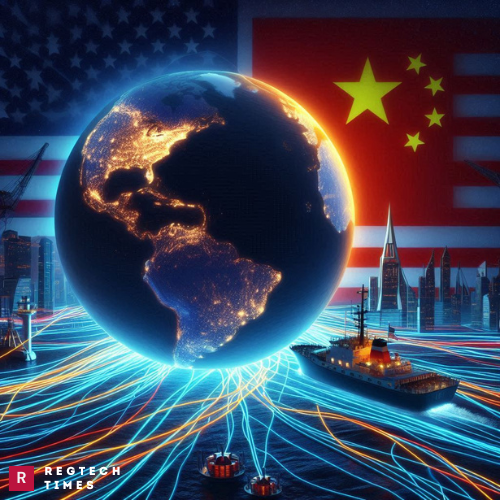In recent months, a series of troubling events have unfolded under the surface of the world’s oceans. Ships from China and Russia have been involved in attacks on the undersea cables that form the backbone of the global internet. These cables connect different continents, carrying vital information across the globe, from emails to social media, and even international banking. By targeting these cables, China and Russia are trying to break apart the internet and create disruptions that could weaken the United States and its allies. This is all part of Beijing’s plan to control more of the world’s technology and communications, and challenge American power.
China’s Growing Influence Over Global Internet Connections
One of the key ways China is trying to control the global internet is through its massive investment in building undersea cables. The Chinese government launched a project known as the “Digital Silk Road” in 2015. The goal of this project is to make China the world leader in internet technology. By constructing these cables, China is building a network that connects different countries to China, which gives Beijing the ability to monitor and control internet traffic.
In the past, Chinese companies like Huawei played a major role in expanding the global internet infrastructure. Before facing U.S. sanctions in 2019, Huawei helped build 15% of the global internet. Now, Chinese companies are set to install nearly half of the underwater cables planned for the years 2023 to 2028. While this may sound like a technological achievement, it also allows China to track the activities of other countries that rely on these cables. Through this control, China can influence the technologies other nations use, push countries to adopt Chinese systems, and even spy on internet traffic.
Latvia-Sweden Undersea Data Cable Damage Linked to Suspect Vessel Michalis San
Sabotage in the Baltic Sea and South China Sea
China’s efforts to disrupt global internet connections are not only about building new cables but also about destroying existing ones. In recent months, Chinese and Russian ships have been involved in attacks that target these crucial underwater cables. One such incident occurred in the Baltic Sea, where a Chinese ship dragged its anchor over the seabed, damaging hundreds of miles of internet cables. Shortly after that, another ship from China reportedly sailed near Taiwan’s internet connection, causing it to snap.
The damage caused by these attacks is not insignificant. Internet traffic gets rerouted through other paths, which causes delays and even temporary disruptions. As more countries rely on fewer cables, each new attack makes the situation more precarious. The goal is not only to cause short-term problems but also to make these countries realize the vulnerabilities in their infrastructure. China and Russia want to weaken the global internet and create a world where countries become more dependent on their technology.
In addition to the attacks on underwater cables, Beijing has also sought to block internet projects that run through the South China Sea, an area where China’s territorial claims are highly disputed. Even though international courts have ruled against China’s claims, Beijing continues to assert control. By cutting off important internet routes in this region, China further limits the ability of countries in Asia to rely on safe, secure internet connections.
Chinese Device Patent Fuels Fears of Undersea Cable Sabotage
NATO’s Security and China’s Strategic Goals
Another important reason China is targeting the global internet is to undermine the United States and its alliances, especially NATO. China sees NATO as a major threat to its ambitions. When Sweden and Finland decided to join NATO in the wake of Russia’s aggression, China viewed this as a setback. NATO is seen as a key American alliance, and weakening it is one of China’s strategies to challenge U.S. power.
China does not limit its efforts to Europe. It is also focused on Taiwan, a small island nation that has a significant role in global technology. Taiwan is home to some of the world’s most important semiconductor factories, which are essential for the production of everything from smartphones to cars. China’s strategy towards Taiwan is to pressure it into surrendering peacefully by isolating the island, cutting off internet connections, and launching military drills near its borders. China hopes that by making Taiwan’s isolation more difficult, the island’s leaders will eventually choose to join China.
The attacks on internet cables in Europe and Asia are part of a broader effort by China to reshape the global order. As the internet becomes an even more vital part of modern life, controlling it offers enormous power. China is working hard to disrupt the status quo, weaken the influence of the United States, and gain control over the technology that connects the world. The message is clear: China wants to be the dominant force in global communications.


